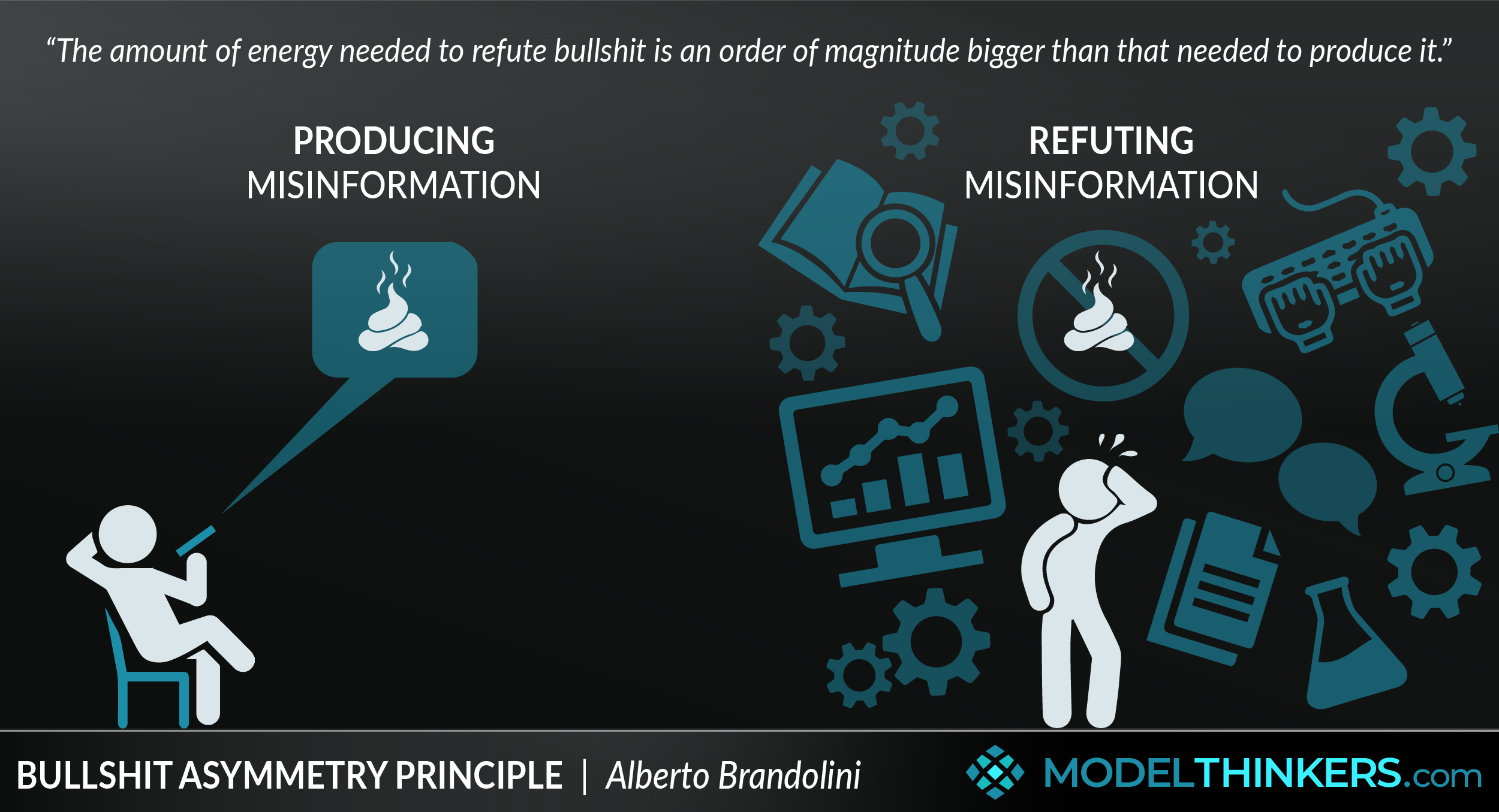Background:
Last week I made a post evaluating an advertisement by Equilibrium Tuning in which they claim their ECU software does not affect the vehicle’s reliability.

I pointed out that EQT did not substantiate the claim, and that having substantiation is a requirement of Federal Advertising Law.
Shortly after, a consumer mentioned the post and in response, Ed Susman from EQT began spreading bullshit about me.
Ed’s interaction with the consumers capitalizes on an aspect of spreading bullshitting that is known as Brandolini’s Law:

Since Ed’s response when facing accountability is prolific bullshitting, I am going to endeavor to point out his application of logical fallacies, baseless opinions, and exploiting cognitive biases, while his bullshit is still fresh.

Comment evaluation:
Ed’s first response to this consumer bypasses engaging on the issue raised and tries to undermine the person bringing the criticism.
This is an exploitation of cognitive biases where people tend to dismiss arguments based on perceived motives rather than engaging with the issues raised.

Ed employs three logical fallacies in his one sentence.
Logical fallacies are errors in reasoning or argumentation that can undermine the validity of an argument. They are often used to mislead or distract from the truth, or to win an argument by appealing to emotions rather than reason.
Logicalfallacies.org
These fallacies Ed uses are, Ad Hominem:
The phrase “completely obsessed with talking crap about us” suggests a personal attack on the individual giving the criticism, which is an Ad Hominem attack. Ed dismisses the person’s critique by attacking their character or motives rather than engaging with their arguments.
The Straw Man:
The phrase “because we didn’t play his games” implies that the person criticizing has unreasonable expectations (“games”) that were not met. This could be interpreted as setting up a straw man argument by misrepresenting the critic’s position as unreasonable or trivial.
The Appeal to Ridicule:
The use of “talking crap about us” employs ridicule to discredit the critic’s viewpoint rather than addressing the specific criticisms raised.
Ed wasn’t done though, true to Brandolini’s Law, Ed easily spread more bullshit while avoiding the issue that was raised.
He next dumped an even bigger pile of bullshit, chock full of logical fallacies:

Running through the logical fallacies in the piece:
Starting with an Ed favorite, the Ad Hominem personal attack:
The whole statement attacks the character of the person rather than addressing the substance of their arguments. Phrases like “hit pieces,” “personal opinions,” and “arguing semantics” are aimed at discrediting the person rather than engaging with their argument.
The Straw Man shows up again:
By describing the person’s work as “arguing semantics passed off as some kind of scientific study,” the statement sets up a distorted version of the argument that is easier to attack or dismiss.
Third up is an Appeal to Motive wrapped around an Equivocation Fallacy, which has been part of an ongoing Argument by Repetition.
The Equivocation Fallacy occurs when Ed describes the questions I asked of EQT as being “demands”.
By characterizing a question as a demand, Ed attempts to shift the focus from the content of my questions to the perceived tone or intention behind them, thereby avoiding a meaningful response.
The remainder of Ed’s statement suggests that I am upset because my questions (demands [sic]) were refused, implying that my criticisms are motivated solely by personal grievances rather than genuine concerns or professional judgment.
Ed’s repeated misrepresentation of questions as demands is the Argument by Repetition logical fallacy. In this fallacy, the person Repeats an argument or a premise over and over again in place of better-supporting evidence.

Ed fits in a Hasty Generalization:
His statement implies that all of my previous work consists of “hit pieces” and personal opinions without providing specific evidence or examples to support this claim. This generalization oversimplifies and mischaracterizes my body of work.
Conclusion:
Overall, Ed’s statements use these fallacies to attack my character and work rather than engaging with any specific arguments or evidence I have presented, i.e. the advertisement that EQT published.
A pattern shown by Ed Susman when facing accountability is to bullshit. Several possible reasons for this behavior are:
- Avoiding Consequences – Bullshitting can be a strategy to avoid the negative consequences that come with admitting fault or taking responsibility.
- Protecting Self-Image – Bullshitting allows individuals to maintain a facade of competence or infallibility.
- Lack of Integrity – Some individuals may lack integrity or ethical principles, choosing to prioritize their gain or agenda over honesty and accountability.
Whatever the reason, consumers must be on guard when interacting with EQT owner Ed Susman. He is a prolific and skilled bullshitter as this evaluation of his latest comments illustrates.
References:
- Equilibrium Tuning unsubstantiated claims about product performance
- Equilibrium Tuning misleading claims for independent product testing
- Ed Susman’s false statements about the flow bench that I use
- Ed Susman’s false statements about my consideration of data
- Ed Susman’s false statements about the testing I’ve done being flawed
- Ed Susman’s false statements about the testing that I perform being limited
- Ed Susman’s false statements about me being a hack
- Ed Susman’s false statements about questions I emailed to the business containing “demands”
- Ed Susman’s false statements to another consumer who commented on my review
- Ed Susman’s statements about professionalism being optional
- Ed Susman’s false statements to a performance shop employee who questioned Ed’s claims
- Ed Susman makes threats to suppress a consumer review
- Ed Susman bullshits a consumer on social media
- Equilibrium Tuning unsubstantiated claim about tune reliability being OEM-like.

After reading your posts over the years, it is kinda disconcerting to find that they’ve refused to engage you with viable proof on their end. I find myself steadily dissuaded from continuing to use their tunes. Admitedly, I am still using their new stage 2 revision as of late April.
It isn’t just me, the responses highlighted in this post were to other consumers. There was another example I highlighted where Ed bullshits another performance shop.
I don’t think EQT is claiming the ECU software does not affect the vehicle’s reliability. That seems like a reach on the words here. Eqt didn’t define what oem like reliability is and as you stated they would have to say what they meant there. I don’t think I could demand or question them to – they don’t need to provide a bunch of data – we didn’t contract them to – it’s not a government contract- we buy a consumer grade product from EQT. It feels like going after the laundry stain treatment that labeled their product as returning your clothes to like-new condition.
The standard that needs to be met is:
“Advertisers are responsible for all reasonable interpretations: To be considered reasonable, the interpretation does not have to be the only one. When a seller’s representation conveys more than one meaning to reasonable consumers, one of which is false, the seller is liable for the misleading interpretation.” – Deception Policy Statement, 103 F.T.C. 174 (1984)
As for having data to substantiate the claims: “Substantiation: Before disseminating an advertisement, the advertiser must substantiate all claims – express and implied – that the ad conveys to reasonable consumers.” – Substantiation Policy Statement, 104 F.T.C. 648 (1984)
When the business states their product provides OEM-like reliability, how do you conclude that means the reliability is not the same as the OEM?
When I said EQT would need to be the ones to explain what they meant, that wasn’t saying that Federal Advertising Regulations aren’t applicable to them, I meant that whatever they were thinking, only they know.
LKQ is not the same as saying “no adverse affect to reliability” in my mind. LKQ may have similar characteristics but may differ in grade and quality.
What is the acronym LKQ standing for in your example?
Based on comments I’ve seen from Ed on facebook…. not even remotely surprised. Why I refuse to do any business with them
lol…I just saw this on TuneZillas page…At TuneZilla, we strive for an OEM level of drivability and reliability.
Yes, EQT advertising pushes past “striving for” all the way to having accomplished.